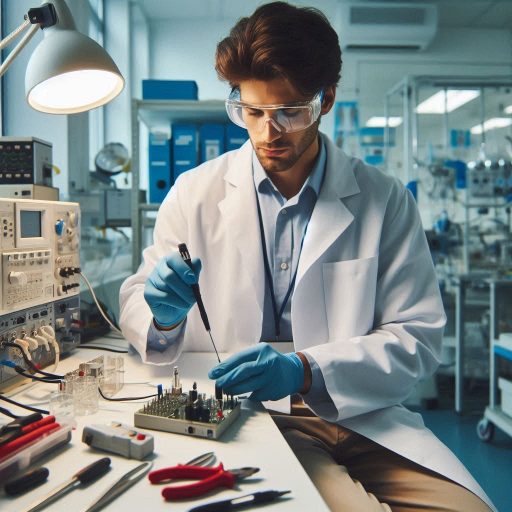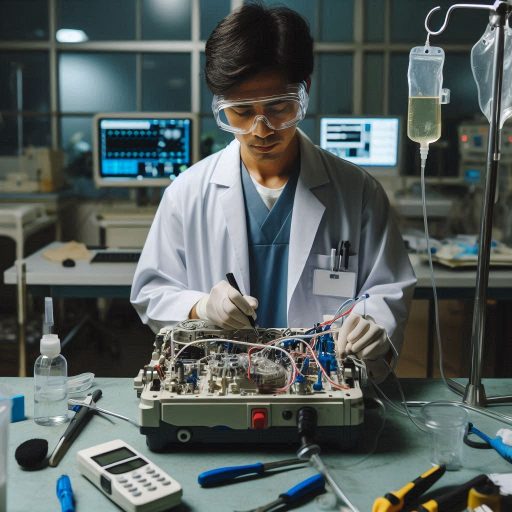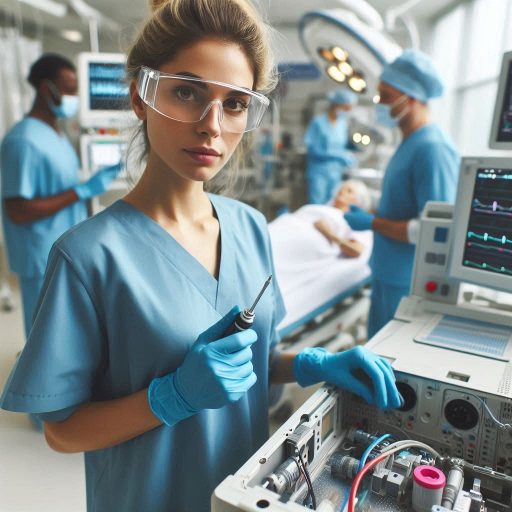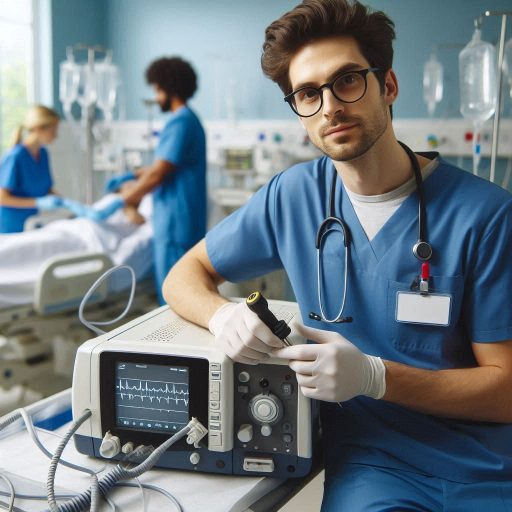Introduction
Biomedical technician careers focus on maintaining and repairing medical equipment critical to patient care.
These professionals ensure that devices like ventilators, MRI machines, and infusion pumps function properly and safely.
The role is vital in healthcare, where reliable technology directly impacts patient outcomes.
Technology plays a crucial role in the healthcare industry, driving innovations that improve diagnosis, treatment, and patient monitoring.
Advanced medical devices and systems have become essential in modern healthcare, requiring specialized knowledge and skills to manage.
As technology evolves, it significantly impacts biomedical technician careers.
Technicians must continuously adapt to new devices, software, and systems.
This shift requires ongoing education and training to stay current with the latest advancements.
The increasing complexity of medical technology also demands a deeper understanding of integrated systems and data management.
In this rapidly changing landscape, biomedical technicians must embrace technological advancements to remain effective in their roles.
The integration of new technologies in healthcare presents both challenges and opportunities for career growth, emphasizing the need for technicians to stay informed and adaptable.
Evolution of technology in healthcare
Advancements in Medical Equipment and Devices
Technology has significantly advanced medical equipment and devices, transforming the biomedical technician’s role.
Innovations in medical technology have led to more complex and sophisticated equipment.
These advancements include more precise diagnostic machines, enhanced imaging systems, and automated devices that improve patient care.
As technology evolves, biomedical technicians must stay updated with the latest developments.
Continuous learning and specialized training are essential for understanding and working with these new devices.
The rapid pace of technological advancement requires technicians to adapt quickly and efficiently.
Integration of Technology in Patient Care
The integration of technology in patient care has revolutionized healthcare delivery.
Modern medical devices play a crucial role in diagnosing, monitoring, and treating patients.
Biomedical technicians ensure that these devices function properly, directly impacting patient outcomes.
From automated infusion pumps to advanced surgical robots, technology-driven equipment is now central to patient care.
Technicians must understand how these devices interact with other systems in the healthcare environment.
Their work ensures that medical technology operates seamlessly, supporting accurate diagnostics and effective treatments.
Role of Biomedical Technicians in Maintaining and Repairing Technology
Biomedical technicians play a vital role in maintaining and repairing medical technology.
Their expertise keeps equipment functioning at optimal levels, ensuring patient safety and care quality.
Technicians perform regular maintenance to prevent equipment malfunctions and extend the lifespan of devices.
When issues arise, they troubleshoot and repair devices promptly, minimizing downtime and disruptions in patient care.
As technology becomes more advanced, the technician’s role grows in complexity, requiring specialized knowledge and skills.
They must understand both the mechanical and software components of modern medical equipment.
Read: Online Courses for Surveying and Mapping Technicians
Increased demand for skilled technicians
Growing Need for Professionals Who Can Work with Advanced Technology
The rise of advanced technology increases the demand for skilled biomedical technicians.
Medical devices are becoming more sophisticated and require specialized knowledge.
Technicians must be adept at operating and maintaining complex equipment.
Innovations such as robotics, AI, and advanced imaging systems are reshaping the field.
Professionals with expertise in these technologies are highly sought after.
As technology evolves, the need for technicians who can understand and implement new tools grows.
This trend drives career opportunities and enhances job security for those who stay current with technological advancements.
Opportunities for Specialization in Specific Areas of Biomedical Technology
The advancement of technology creates numerous opportunities for specialization within biomedical technology.
Technicians can focus on areas such as medical imaging, laboratory instruments, or robotic systems.
Specialization allows technicians to develop deep expertise in specific technologies.
This expertise makes them invaluable to healthcare facilities using specialized equipment.
Specializing in high-demand areas can lead to advanced roles and higher earning potential.
Technicians who pursue certifications and advanced training in these areas position themselves as leaders in their field.
Specialization also opens doors to roles in research and development, further broadening career prospects.
Impact of Technology on the Job Market for Biomedical Technicians
Technology significantly impacts the job market for biomedical technicians.
The increasing complexity of medical devices creates a higher demand for skilled professionals.
Technicians with advanced technical skills are more competitive in the job market.
As healthcare facilities adopt new technologies, they seek technicians who can manage and maintain these innovations.
Technology also influences job roles, with new positions emerging in areas such as telemedicine and digital health.
However, the rapid pace of technological change requires continuous learning and adaptation.
Technicians who embrace new technologies and pursue ongoing education will remain relevant and in demand.
The growing need for professionals skilled in advanced technology expands career opportunities for biomedical technicians.
Specialization in specific areas of biomedical technology offers avenues for career advancement and expertise.
Technology shapes the job market by increasing demand for skilled technicians and creating new roles.
Staying updated with technological advancements and pursuing specialization are key strategies for thriving in this evolving field.
Read: CAD Technician Salary: What to Expect in the USA
Training and education requirements
Importance of Staying Updated on Latest Technology Trends
Staying updated on the latest technology trends is crucial for biomedical technicians.
The field of biomedical technology evolves rapidly with new advancements.
Technicians must keep abreast of these changes to remain effective in their roles.
Emerging technologies can introduce new types of medical equipment and diagnostic tools.
Understanding these innovations ensures that technicians can properly maintain and repair the latest devices.
Regularly reviewing industry news and participating in technology webinars can provide valuable insights.
Staying informed helps technicians stay competitive and enhances their problem-solving capabilities.
Incorporation of Technology in Biomedical Technician Training Programs
Technology plays a significant role in modern biomedical technician training programs.
Educational institutions integrate the latest technologies into their curricula to reflect industry needs.
Training programs now include simulations and hands-on labs with advanced equipment.
This approach provides practical experience with the technologies technicians will encounter in the field.
Virtual reality and augmented reality tools are also used to enhance learning experiences.
Incorporating these technologies into training helps prepare technicians for real-world challenges.
It ensures they are proficient with current and emerging technologies upon graduation.
Need for Continuous Learning and Professional Development
Continuous learning and professional development are essential for biomedical technicians to thrive.
The rapid pace of technological advancement requires ongoing education.
Technicians must pursue additional certifications and training to stay current.
Many professional organizations offer workshops, courses, and seminars that focus on new technologies and best practices.
Engaging in these learning opportunities helps technicians adapt to changes in the industry.
Professional development also opens doors to career advancement and specialization.
Staying committed to learning ensures that technicians maintain high competency levels and meet industry standards.
Read: Top CAD Software for Aspiring CAD Technicians
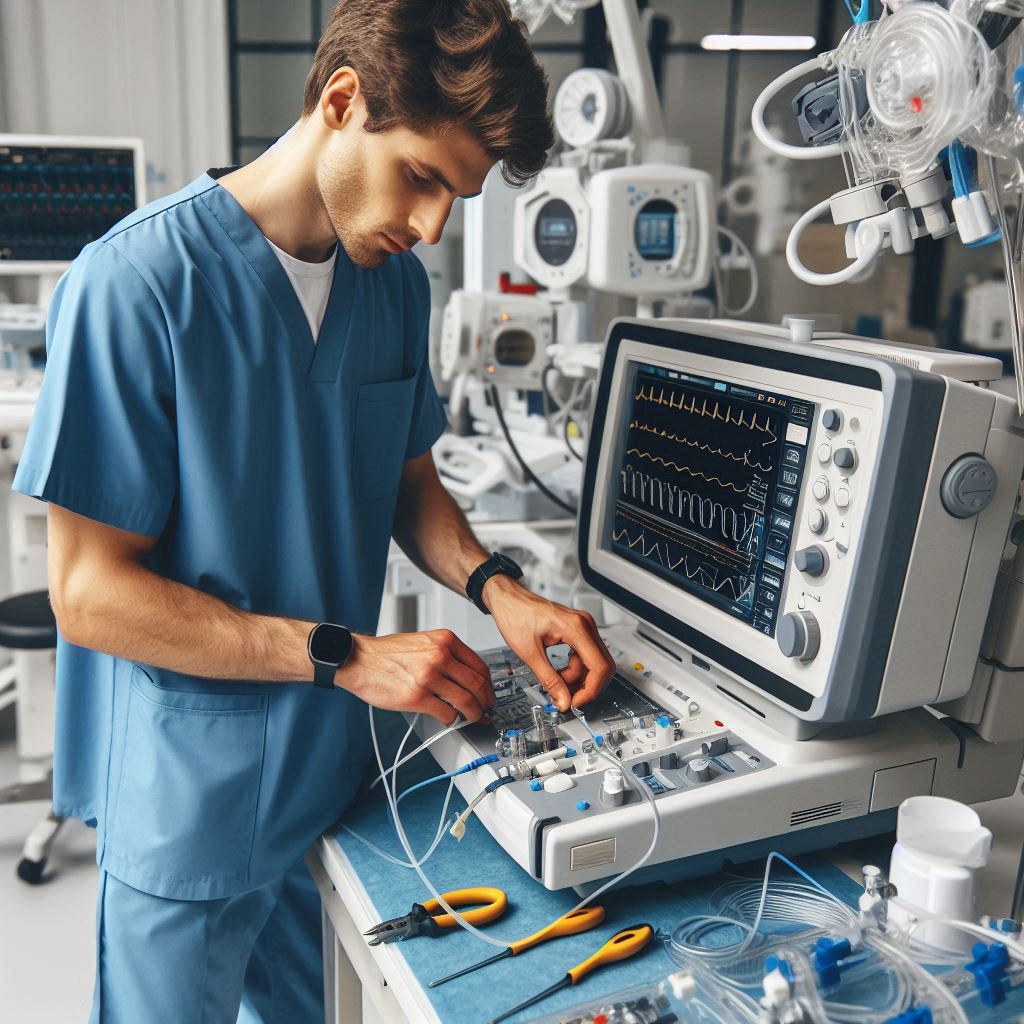
Job responsibilities and skills
- Shift towards more technical and specialized tasks
- Ability to troubleshoot and repair complex equipment
- Importance of strong communication and problem-solving skills
In the rapidly evolving field of biomedical technology, the roles and responsibilities of biomedical technicians are constantly changing.
With the advancement of technology, the job responsibilities and required skills for biomedical technicians have greatly evolved in recent years.
Shift towards more technical and specialized tasks
Biomedical technicians are now required to have a deeper understanding of complex medical equipment and systems.
They must be able to work with advanced technology such as MRI machines, CT scanners, and robotic surgery systems.
This shift towards more technical and specialized tasks means that biomedical technicians must constantly update their skills and knowledge to stay relevant in the field.
Ability to troubleshoot and repair complex equipment
Biomedical technicians play a crucial role in ensuring that medical equipment is functioning properly and accurately.
This requires the ability to troubleshoot technical issues, diagnose problems, and repair equipment in a timely manner.
Biomedical technicians must be detail-oriented and have a strong problem-solving mindset to effectively address equipment malfunctions and prevent disruptions in patient care.
Importance of strong communication and problem-solving skills
Effective communication is key for biomedical technicians to collaborate with healthcare professionals, manufacturers, and other team members.
Clear communication ensures that all parties involved are informed about equipment issues and maintenance schedules.
Additionally, strong problem-solving skills are essential for biomedical technicians to quickly identify and resolve technical problems, minimizing downtime and ensuring patient safety.
The impact of technology on biomedical technician careers has led to a shift towards more technical and specialized tasks, emphasizing the importance of troubleshooting complex equipment and requiring strong communication and problem-solving skills.
As technology continues to advance, biomedical technicians must adapt to these changes and continuously improve their skills to meet the demands of the field.
Read: How to Become a CAD Technician: Step-by-Step Guide
Transform Your Career Today
Unlock a personalized career strategy that drives real results. Get tailored advice and a roadmap designed just for you.
Start NowCollaboration with other healthcare professionals
Working with doctors, nurses, and IT specialists to ensure proper functioning of
Biomedical Technicians work closely with doctors, nurses, and IT specialists to ensure technology functions properly.
This collaboration is essential for maintaining and troubleshooting medical equipment.
Technicians often provide technical support and training to healthcare staff.
By working together, they ensure that medical devices are used effectively and safely.
Effective communication between technicians and healthcare professionals helps in quickly addressing any issues that arise.
This teamwork is vital for seamless patient care and operational efficiency.
Technicians also contribute to enhancing the overall technological environment in healthcare settings through their expertise.
Implementing and Maintaining Electronic Health Records Systems
Biomedical Technicians play a crucial role in implementing and maintaining electronic health records (EHR) systems.
They ensure that these systems are integrated with existing medical technologies.
Technicians help set up EHR software and hardware, ensuring compatibility with other devices.
They also provide training and support to healthcare staff on using these systems.
Regular maintenance and updates are part of their responsibilities to ensure the EHR systems run smoothly.
Technicians troubleshoot any issues that arise with EHR systems to minimize disruptions.
Their role is critical in maintaining the efficiency and reliability of electronic health records.
Contribution to Interdisciplinary Teams
Biomedical Technicians significantly contribute to interdisciplinary teams in healthcare settings.
They collaborate with professionals from various fields to address complex issues involving medical technology.
By participating in team meetings, technicians provide valuable insights into the functionality and maintenance of medical devices.
Their input helps in developing strategies for improving equipment performance and patient care.
Technicians also assist in integrating new technologies and innovations into existing systems.
Their interdisciplinary approach ensures that all aspects of patient care and technological support are addressed comprehensively.
This teamwork enhances overall healthcare delivery and patient outcomes.
Delve into the Subject: Specializations in Laboratory Technician Roles
Impact on Patient Care and Outcomes
Enhancing Accuracy and Efficiency of Medical Procedures
Technology significantly enhances the accuracy and efficiency of medical procedures.
Advanced diagnostic tools and automated systems streamline the processes.
For example, modern imaging systems provide clearer and more detailed results, aiding in precise diagnostics.
Biomedical Technicians (BMETs work with sophisticated devices like robotic surgical instruments and automated analyzers.
These technologies reduce human error and increase procedural accuracy.
They ensure that medical procedures are performed with higher precision and efficiency.
Regular updates and calibration of these devices are crucial.
BMETs must ensure that all equipment operates within specified parameters.
Proper maintenance helps maintain the accuracy of medical procedures, ultimately improving patient outcomes.
Improving Diagnosis and Treatment Options
Technology also improves diagnosis and treatment options.
Innovative medical devices and software enhance the ability to detect and treat various conditions.
Advanced imaging technologies, such as MRI and CT scans, provide more detailed views of the body.
New diagnostic tools help physicians identify conditions earlier and more accurately.
These advancements lead to better-targeted treatments and more effective patient care.
BMETs play a critical role in managing and maintaining these technologies to ensure their optimal performance.
Furthermore, telemedicine and remote monitoring technologies allow for more flexible treatment options.
BMETs support these technologies by ensuring their functionality and addressing any technical issues that arise.
This support helps healthcare providers deliver timely and accurate care.
Ensuring Patient Safety Through Proper Equipment Maintenance
Ensuring patient safety is a fundamental responsibility for BMETs.
Proper maintenance of medical equipment is essential to prevent malfunctions that could compromise patient safety.
Regular inspections, calibration, and repairs are crucial components of equipment management.
BMETs must adhere to strict safety protocols and industry standards.
They are responsible for identifying potential issues before they impact patient care.
Implementing routine maintenance schedules and following manufacturer guidelines help keep equipment in top condition.
In addition, BMETs should stay informed about the latest safety regulations and best practices.
Continuous education and training help them stay updated on new technologies and maintenance techniques.
By prioritizing patient safety, BMETs contribute to a higher standard of care.
Uncover the Details: Work-Life Balance for Laboratory Technicians
Challenges and opportunities in the field
Balancing traditional mechanical skills with technological knowledge
Biomedical technicians need to balance traditional mechanical skills with modern technological knowledge.
Their work involves maintaining and repairing both classic and cutting-edge medical equipment.
Understanding how older devices operate helps in troubleshooting and repairs.
At the same time, proficiency in new technologies is crucial as healthcare technology advances.
Technicians must be adept in diagnosing mechanical issues and managing complex software systems.
Combining these skills allows for comprehensive equipment maintenance and effective problem-solving.
For instance, a technician might need to repair a traditional infusion pump while also managing its integration with newer electronic health record systems.
Adapting to constant changes and updates in healthcare technology
The field of healthcare technology evolves rapidly, presenting challenges for biomedical technicians.
New devices and software updates require continuous learning and adaptation.
Technicians must stay updated on the latest technological advancements, software upgrades, and regulatory changes.
Attending workshops, completing certification programs, and participating in training sessions are essential for keeping skills current.
Technicians should actively seek out educational opportunities to understand emerging technologies and their applications.
This adaptability ensures that technicians remain effective in a field where technology is constantly evolving.
Potential for Career Advancement and Specialization in High-Demand Areas
As technology progresses, new career opportunities and specializations emerge for biomedical technicians.
Technicians can advance into roles such as biomedical equipment managers or clinical engineers.
Specializing in high-demand areas, like imaging systems or robotic surgery equipment, offers increased career growth and earning potential.
Certifications in specialized fields, such as radiology or IT systems, enhance career prospects and open doors to advanced positions.
Technicians with expertise in emerging technologies can become leaders in their field, guiding others and influencing industry practices.
By balancing traditional skills with modern knowledge and adapting to technological changes, biomedical technicians can thrive in their careers.
The field offers diverse opportunities for specialization and advancement, reflecting the dynamic nature of healthcare technology.
Embracing these opportunities ensures continued professional development and success in an evolving industry.
Conclusion
Technology significantly impacts biomedical technician careers, shaping their roles and responsibilities.
Advanced medical devices require technicians to stay updated with the latest innovations.
Emerging technologies, such as AI and IoT, are transforming how equipment is maintained and repaired.
Technicians now need skills in software and data analysis alongside traditional mechanical expertise.
Embracing these technological advancements is crucial for career growth and relevance.
New tools and systems improve diagnostic accuracy and efficiency, highlighting the need for ongoing learning.
Technicians who adapt to technological changes position themselves as valuable assets in the healthcare field.
Keeping abreast of trends ensures that professionals remain competitive and effective in their roles.
Technology also influences the nature of training and certification programs, emphasizing the need for specialized knowledge.
By embracing these advancements, biomedical technicians enhance their problem-solving skills and career prospects.
The future of this field depends on the ability to integrate new technologies into daily practices.
Encourage continuous education and adaptation to thrive in an evolving landscape.
Technology‘s role in shaping careers underscores the importance of staying informed and skilled for long-term success.

